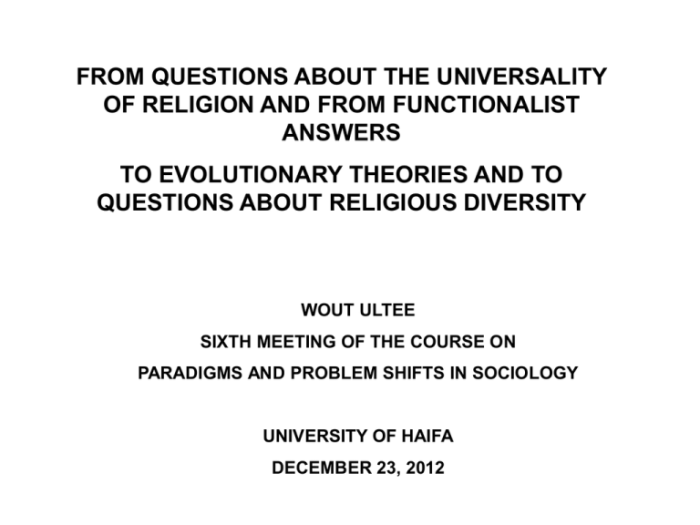Sociologists study religion because religious beliefs and meanings profoundly shape human societies. These beliefs and practices influence social norms, institutions, cultural identities, social change, and inequality. This multifaceted exploration delves into the intricate relationship between religion and society, revealing its impact on our collective experiences.
From shaping social values to fostering community cohesion, religion plays a vital role in human interactions. It shapes our understanding of the world, influences our behaviors, and provides a sense of belonging. Sociologists examine how religious organizations contribute to social welfare, facilitate social change, and sometimes create tensions with secular institutions.
Religious Beliefs and Social Norms

Religious beliefs play a significant role in shaping social norms and values. They provide a framework for understanding the world and our place within it, influencing our moral compass and guiding our actions.
Religious practices, such as rituals, prayers, and dietary restrictions, also impact social interactions and behaviors. They create shared experiences that foster a sense of community and reinforce social bonds.
Impact on Social Cohesion and Conflict
Religious beliefs can contribute to social cohesion by providing a common set of values and beliefs that unite individuals. They can also lead to conflict when different religious groups hold opposing views or compete for resources.
Religion and Social Institutions
Religion is closely intertwined with various social institutions, including family, education, and government. Religious organizations often play a vital role in providing social welfare services, such as healthcare, education, and community support.
Potential for Conflict, Sociologists study religion because religious beliefs and meanings
However, there is also potential for conflict between religious and secular institutions. Religious beliefs may clash with scientific knowledge or legal principles, leading to tensions and disputes.
Religion and Cultural Identity
Religion is a powerful force in shaping cultural identity. Religious symbols, rituals, and narratives provide a sense of belonging and collective memory for individuals and communities.
Relationship with Social Boundaries
Religious identity can also create social boundaries, distinguishing individuals from those who do not share the same beliefs. This can lead to both positive and negative consequences, fostering a sense of community but also potentially excluding outsiders.
Religion and Social Change: Sociologists Study Religion Because Religious Beliefs And Meanings

Religious beliefs and practices have played a significant role in social change movements throughout history. Religious leaders and organizations have inspired and mobilized people to fight for social justice, equality, and human rights.
Role in Promoting or Resisting Change
However, religion can also be a force for resistance to social change. Religious ideologies may justify traditional practices or oppose progressive reforms, leading to conflicts between religious and secular forces.
Religion and Social Inequality

Religious beliefs can have a complex relationship with social stratification. Some religious ideologies may justify or perpetuate social inequalities, while others may challenge them and promote social mobility.
Role in Addressing Social Injustice
Religious organizations can play a vital role in addressing social injustice by providing support to marginalized communities and advocating for their rights.
Essential Questionnaire
What is the primary focus of sociologists studying religion?
Sociologists study religion to understand its impact on social norms, institutions, cultural identity, social change, and inequality.
How do religious beliefs shape social norms?
Religious beliefs provide guidelines for behavior, influencing what is considered acceptable or unacceptable within a society.
What is the role of religion in social change?
Religious beliefs and organizations can inspire social movements, promote reforms, and influence political transformations.